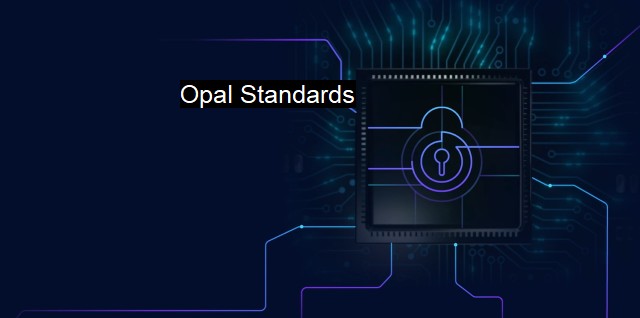What are Opal Standards?
Opal Standards: The Importance of Standardized Self-Encrypting Drives in Cybersecurity and Antivirus Tools
Opal Standards are an incredible advent in the realm of cybersecurity and antivirus. These standards were introduced by a consortium of widely recognized industry-dominators in the field known as the Trusted Computing Group (TCG). Launched with the objective of increasing security in automated information systems, Opal Security Subsystem Class (Opal SSC) specifically pertains to data-at-rest security.Basically, the data-at-rest security involves securing data which is stored in permanent storage such as disk drives or any other media. Here Opal Standards play a role by delivering features that let the storage device ( a hard drive) protect this data independent of its host system. The aim is to maintain strong defensive cryptography autonomy for protecting the data-at-rest and managing device misplacement incidents before it's too late.
Opal Standards provide two significant entities: locking ranges and data stores. A locking range provides hardware-based encryption to protect data. It also allows predefined areas of the storage device to be independently secured. These areas can be unlocked and locked again by specific credentials only.
There is clearer peace of mind due to this feature as permissions and privacy are very stringently controlled. It is drastically difficult for unauthorized individuals to access the sensitive data. Data stores, on the other hand, are another entity of Opal Standards. These stores deliver a robust mechanism to securely handle arbitrary data — often other than the user's information — that is properly tied to the features and control structures on the Opal drive.
The crux is that these Opal Standards brilliantly tie into disk drives directly, securing the specific content on the drive even when it is removed from its native system. This is especially juicy in an environment where high-mobility systems like laptops and handheld machines are equally if not more, prone to data violations.
In fact, Opal Standards also provide a solution to a nagging vulnerability that includes all operating systems. Although many of these use security features like full disk encryption at the software level, without having a password-enabled screen saver or forcing the user to shut down their system altogether, data remains garishly exposed to cyberattacks. Opal Standards neatly sidestep these limitations with a feature: pre-boot authorization (PBA).
The pre-boot authorization ensures a user cannot access the operating system until the proper credentials to unlock the protected area on the hard drive have been provided. This ensures the encased data stays locked away until properly authenticated. Needless to emphasize, this elevates the threshold of ensuring system integrity as it blocks unauthorized users from accessing valuable data when they boot up the computer.
In the context of antivirus software, Opal Standards similarly gives an advantage as it helps maintain data confidentiality throughout inevitable interception attempts while also remaining unaffected or uncompromised by virus invasions. This powerful ally gives businesses and organizations an unparalleled level of control and security over valuable data, minimizing the impact of any digital hazards or threats.
With the modern world becoming densely network-oriented that holds a wealth of sensitive data, Opal Standards hold something beautiful: a promise of exceedingly increased security while reducing the risk and potential damage from intrusions and violations. Also, propelling cybersecurity to an advanced echelon making the system a leading pioneer. From the perspective of cybersecurity and antivirus platforms, Opal Standards are expected to continue leading robust, cyber resilient landscapes.

Opal Standards FAQs
What is Opal?
Opal is a security framework that provides a set of standards, guidelines, and best practices to protect and secure data from cyber threats. It is specifically designed to enhance the security of antivirus products by ensuring they meet specific security requirements.What are the Opal standards?
The Opal standards consist of a set of best practices and guidelines that antivirus products must follow to ensure they provide adequate protection against cyber threats. These standards cover a wide range of security aspects, including malware detection and prevention, threat intelligence, behavior analysis, and more.How do antivirus products comply with Opal standards?
Antivirus products comply with Opal standards by undergoing rigorous testing and evaluation processes. These processes include a set of functional and security tests that assess antivirus products' ability to meet specific standards and guidelines. Once a product meets these standards, it is awarded an Opal Certification, which indicates that it has met all necessary security requirements.Why are Opal standards important?
Opal standards are essential because they ensure antivirus products' effectiveness in protecting users from cyber threats, such as viruses, malware, spyware, and other malicious programs. These standards also ensure that antivirus products use the latest security technologies and techniques to detect and prevent new and emerging threats. By complying with Opal standards, antivirus products can provide users with the highest level of protection against cyber threats.| | A | | | B | | | C | | | D | | | E | | | F | | | G | | | H | | | I | | | J | | | K | | | L | | | M | |
| | N | | | O | | | P | | | Q | | | R | | | S | | | T | | | U | | | V | | | W | | | X | | | Y | | | Z | |
| | 1 | | | 2 | | | 3 | | | 4 | | | 7 | | | 8 | | |||||||